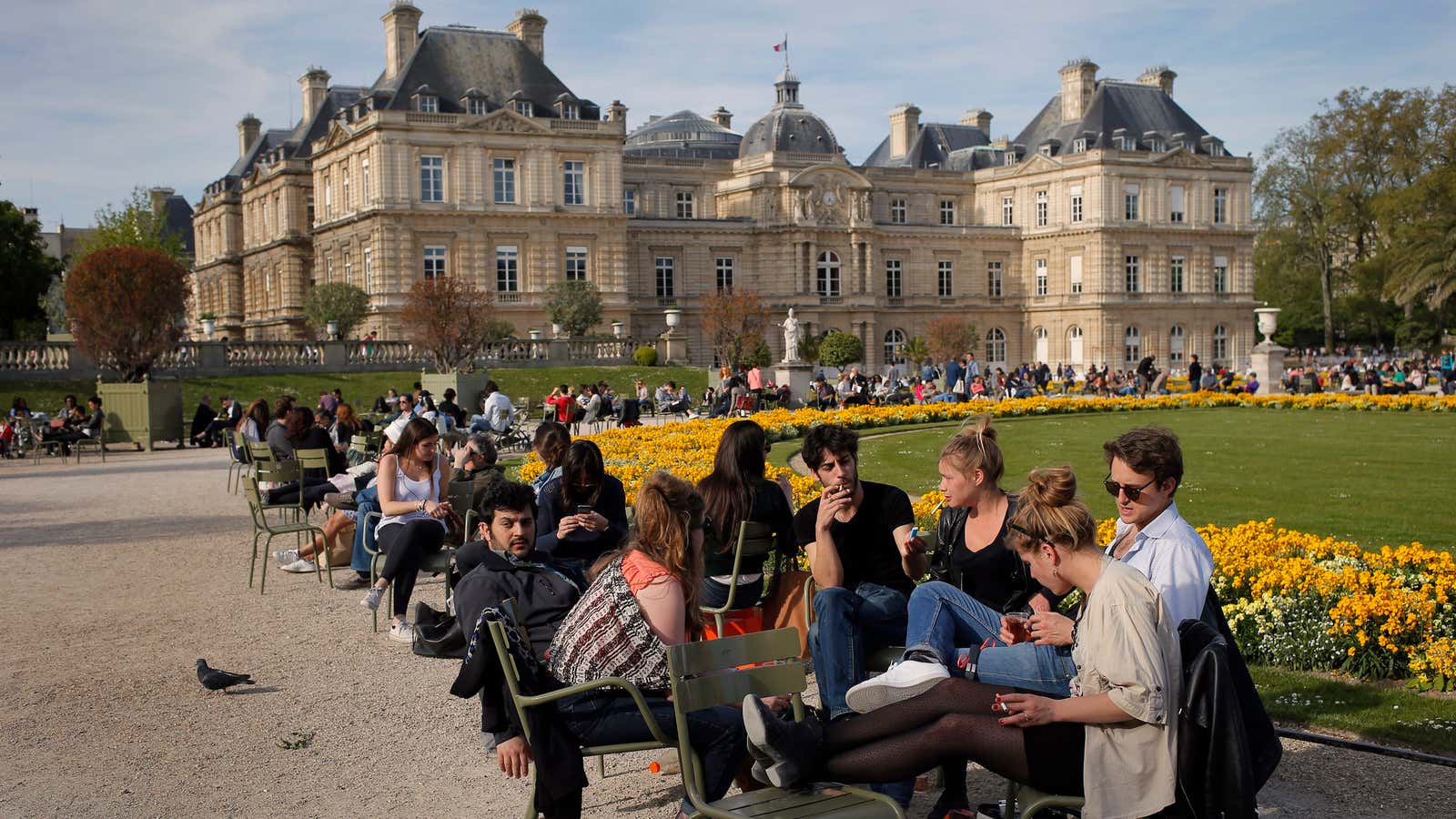I know my friends very well—including their sexual preferences. I know how my friend V. lost her virginity. I know that R. doesn’t like oral sex, and that M. likes to watch gay porn. We talk about almost everything. But in France, the one thing we don’t talk about is money.
In fact, in France, it’s more taboo to talk about money than it is to talk about sex, according to Janine Mossuz-Lavau, a sociologist and senior researcher at the Cevipof, the political research center of Sciences Po Paris. An opinion poll published in June 2015 by the Odoxa Institute shows that 48% of French people say it’s not easy to talk about their earnings. Personally, I don’t know how much money my friends make, whether they have savings or struggle with debt.
Mossuz-Lavau attributes this historical French reluctance to several factors, including our peasant heritage as well as the influence of Catholicism and Marxism.
“Most French people come from the peasantry,” says Mossuz-Lavau, author of the 2007 book L’Argent et nous (Money and us). “Farmers would not put money in the bank but would hide it away, in cash, somewhere in the house. They were very careful not to talk about it so that nobody would steal it. They needed to keep it for the following year, in case the crop went bad.”
This system encouraged a sort of superstition: The less you talk about money, the more likely you are to keep it. This mindset was exemplified by my great-grandmother, who always wore the same pair of threadbare stockings. After she died, we discovered 20 pairs of brand-new stockings in her bedroom closet.
Then there is the role of Catholicism, which remains influential despite the decline of practicing Catholics in the country. Catholicism “is a religion for the poor,” Mossuz-Lavau says. “It is considered that the rich won’t go to heaven, and that it’s a good thing to help the poor. So there is a suspicion towards money and the ones who earn it.”
The Marxist ideology progressively introduced into France in the 1920s and 1930s may also have played a role. “What we remember from the Marxist ideology is that profit is bad. It’s an oversimplification, but it still has an influence on leftists,” she says. Indeed, the Odoxa poll shows that eight out of 10 French people, whatever their income, say that being rich is frowned upon in their society.
Listening to Mossuz-Lavau, I wondered if younger generations could be spared some of this financial awkwardness. I’ve observed that many of my peers seem to have a more uninhibited relationship with spending on indulgences. And I wondered about the influence of increasing secularism in France: According to a 2013 study conducted by the CSA polling institute, the majority of people in the country under 35 are not religious.
I decided to talk to a few young, educated French people and put that theory to the test. Justine is 34 and works as an accounts director in advertising. She lives in Paris and comes from a wealthy family. She says she inherited her uneasy attitude towards money from her parents.
“When, as a child, I asked my father about the price of something, he didn’t like it,” she remembers. “It bothered him. He didn’t want money to be an issue. It has something to do with the fact that people who talk about money are vulgar.”
Estelle, a 27-year-old who works as an advisor at a Paris bank, says that money is “not her favorite topic”—even though it’s a big part of her job. She spends money quickly, especially when she goes out. “I come from a low-income family, with no savings, no estate, a small pay, for whom money has always been a real issue,” she says.
The fact that Justine and Estelle come from wealthy and working-class backgrounds, respectively, may play a part in their respective financial reticence. The Odoxa survey shows that middle-class people, defined as those who earn between 2,500 and 3,500 euros per month, have the easiest time talking about money. It’s harder for people with low incomes and people who earn over 3,500 euros a month.
Mossuz-Lavau says these findings make intuitive sense. Talking about money can feel demeaning for people with low incomes, whereas wealthy people fear they may have to justify their salary.
It’s also important to note that French socialism helps enable people to avoid financial discussions. Because the government helps cover the costs of school and health care, people arguably don’t have to talk about money as much on a daily basis.
But while French people young and old may continue to feel uncomfortable discussing money, they do seem to be pretty good at saving it. In fact, they rank among the world’s biggest savers. French people save an average of “15.5% of their gross available income,” says Flavien Neuvy, an economist and the director of the Cetelem Consumer Observatory. Savings rates tend to be tightly linked to the amount of trust that people have in the future. “In France, we are pessimistic,” he says, “so we usually want to save.”
